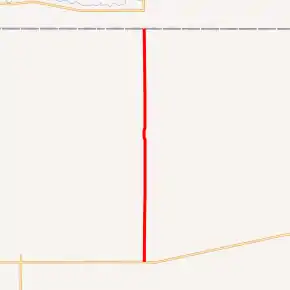K-161 (Kansas highway)
K-161 is a 17-mile-long (27 km) north–south state highway located entirely within Cheyenne County in the U.S. State of Kansas. K-161's southern terminus is at U.S. Route 36 (US-36) in Bird City and the northern terminus is a continuation as Nebraska Highway 61 (N-61) at the Nebraska border. The entire length of K-161 is designated as the Ancient Indian Traders Trail.[3]
| ||||
|---|---|---|---|---|

K-161 highlighted in red | ||||
| Route information | ||||
| Maintained by KDOT | ||||
| Length | 17.000 mi[1] (27.359 km) | |||
| Existed | November 24, 1954[2]–present | |||
| Tourist routes | Ancient Indian Traders Trail[3] | |||
| Major junctions | ||||
| South end | ||||
| North end | ||||
| Location | ||||
| Counties | Cheyenne | |||
| Highway system | ||||
| ||||
K-161 become a state highway on November 24, 1954, as Cheyenne County had brought the roadway up to state highway standards. The route has not been changed since it was established. K-161 was designated as the Ancient Indian Traders Trail in 2014.
Route description
K-161 begins at US-36 in the northwest part of Bird City. It continues north, crosses a Nebraska Kansas Colorado Railway track then exits the city.[4] As it exits the city the highway continues north through flat rural farmland and after about 4.8 miles (7.7 km) transitions to rolling hills covered with a mix of grasslands and exposed soils. It continues north and after another two miles (3.2 km) it crosses Wolfe Canyon. It continues north and after about two miles (3.2 km), curves slightly to the west through a series of hills and crosses Big Timber Creek. After clearing the hills and transitioning back to flat rural farmlands, the highway resumes a due north course for a further 6.3 miles (10.1 km) then intersects County Road Dd. It continues north for another one mile (1.6 km) then crosses into Nebraska, where the road becomes Nebraska Highway 61 (N-61).[5][6] The entire length of K-161 is designated as the Ancient Indian Traders Trail.[3]
The Kansas Department of Transportation (KDOT) tracks the traffic levels on its highways, and in 2017, they determined that on average the traffic varied from 435 vehicles per day near the southern terminus to 635 vehicles per day near the northern terminus.[7] The entire route is paved with partial design bituminous pavement.[1][8] K-161 is not included in the National Highway System.[9] The National Highway System is a system of highways important to the nation's defense, economy, and mobility.[10]
History
K-161 was first approved to become a state highway in a November 24, 1954 resolution, as soon as Cheyenne County had finished constructing the roadway to state highway standards. Cheyenne County soon finished projects to bring the road up to state highway standards and then in a February 21, 1955 resolution, it was established as a state highway.[2] The route has not been changed since it was established.[5][11]
In 2014, state representative Cassidy showed support to designate K-161 as the Ancient Indian Traders Trail. K-161 was designated this due to it being near the route of a trail historically used as a hunting, military, and trading route over a long period of time. The cost of making and installing the two signs would be $2,140, along with $1,070 for future maintenance was provided to KDOT.[12] The signs were unveiled at a ribbon cutting ceremony in Bird City on September 7, 2014.[13]
Major intersections
The entire route is in Cheyenne County.
| Location | mi[1] | km | Destinations | Notes | |
|---|---|---|---|---|---|
| Bird City | 0.000 | 0.000 | Southern terminus | ||
| Bird City Township | 17.000 | 27.359 | Continuation into Nebraska | ||
| 1.000 mi = 1.609 km; 1.000 km = 0.621 mi | |||||
References
- Kansas Department of Transportation (July 19, 2012). "Pavement Management Information System". Retrieved December 11, 2012.
- State Highway Commission of Kansas (February 12, 1955). "Certification by State Highway Engineer in Compliance with Resolution adopted by the Commission November 24, 1954". Topeka: State Highway Commission of Kansas. Retrieved September 12, 2019.
- KDOT (2015). "Kansas Memorial Highways, Bridges and Interchanges" (PDF). Topeka: KDOT. Retrieved September 12, 2019.
- Bureau of Transportation Planning (October 2002). City of Bird City (PDF) (Map). KDOT City Maps. Topeka, KS: Kansas Department of Transportation. Retrieved August 16, 2020.
- Bureau of Transportation Planning (2008). Cheyenne County (PDF) (Map). Scale not given. General Highway Map. Topeka: Kansas Department of Transportation. Retrieved September 12, 2019.
- Google (December 11, 2012). "K-161 (Kansas highway)" (Map). Google Maps. Google. Retrieved December 11, 2012.
- Bureau of Transportation Planning (2018). Traffic Flow Map Kansas State Highway System (PDF) (Map). [c. 1:1,584,000]. Topeka: Kansas Department of Transportation. Retrieved September 12, 2019.
- Staff (2012-05-09). "Pavement Management Information System Glossary". Kansas Department of Transportation.
- Federal Highway Administration (May 8, 2019). National Highway System: Kansas (PDF) (Map). [c. 1:3,900,000]. Federal Highway Administration. Retrieved September 12, 2019.
- Natzke, Stefan; Neathery, Mike; Adderly, Kevin (September 26, 2012). "What is the National Highway System?". National Highway System. Federal Highway Administration. Retrieved September 12, 2019.
- State Highway Commission of Kansas (1954). Cheyenne County (PDF) (Map). Scale not given. General Highway Map. Topeka: State Highway Commission of Kansas. Retrieved September 12, 2019.
- Kansas Legislature (2014). "Supplemental Note On Substitute For House Bill No. 2424" (PDF). kslegislature.org. Retrieved June 23, 2020.
- Kansas Department of Transportation (September 17, 2014). "Translines EXPRESS". Topeka: Kansas Department of Transportation. Retrieved June 23, 2020.
